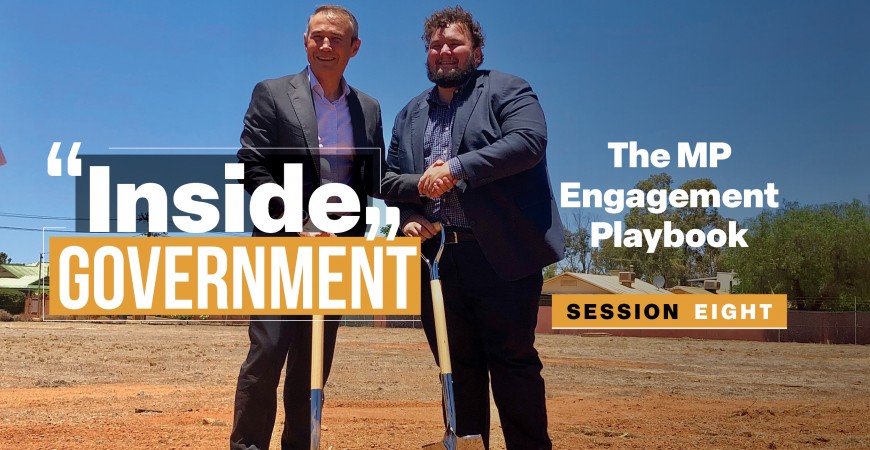In the rush to identify a small group of decision-makers, the effort to liaise with a local member of parliament (MP) can often be overlooked or deprioritised – and this could risk Ministerial support, and your project getting off the ground.
Any project seeking government support requires the development of a clear strategy to keep stakeholders updated and invested in its success.
ReGen Strategic offers a complete stakeholder engagement strategy development service, built on this early engagement and continuous communication between the client and priority stakeholders.
This article provides some practical insight on the value of incorporating both 'bottom-up’ and ‘top-down’ approaches, in order to align any decision-making with a known community priority.
It is critical that community needs, advocated for by a local member, are in alignment with government policy, macro-economic trends, and market indicators. Successful projects incorporate engagement with policy drivers across the three tiers of government.
An understanding of how community needs align to a wider array of government policies will take you a long way – and it all starts with the local electorate office.
It's often a simpler pathway for your local member to champion your project. Early support from a significant stakeholder can assist with leveraging other trusted relationships.
With elections to be held federally and in WA within the next year, now is the perfect time to think about how your plans might need to be adjusted.
- Research
Understand how your project aligns with the Government’s strategic agenda. What problem will you solve for them? How does your project align with government or the local member’s priorities or challenges? Identify how your initiative can address current governmental priorities or challenges. Research the local member’s interests and electoral base to tailor your approach. Know whether they are in the upper or lower house and consider their influence and support areas.
- It’s not just the local member – consider their staff too
As adept researchers with a finger on the pulse of their communities, the local member’s staff can significantly impact the member’s first impressions of your project. Call to introduce yourself and your project to the electorate office courteously. Ask if this is a convenient time to speak and note down the staff member’s name. Briefly describe your project and request a meeting with the local member. You will not get a confirmed meeting right away. Forward over a concise summary and relevant links via email, including your contact information and if you are a local constituent.
- Follow up diligently
Once a meeting is scheduled, confirm it promptly and inform the office of any additional attendees. Inquire if there are specific interest areas or concerns the local member might have. This preparation ensures a focused discussion and highlights your respect for the local member’s time.
- Practice makes perfect
Mark Twain opined about the difficulty of being brief, so prepare and then prepare again, ensuring you can present it clearly in various formats — a one-sentence overview, a 30-send elevator pitch and a detailed 20-minute version.
- Be specific
Be specific about your ask; whether it’s for a Ministerial letter, media support, or funding. Having a local member’s backing can significantly reduce the risk of delays when approaching Ministers or Departments.
- Listen and adapt
Pay close attention to the local member’s reactions and feedback. Naturally, they will evaluate how your project impacts their electorate. Be prepared to adjust your approach based on their suggestions, whether that means refining the project, or providing clarifying information.
- Keep in touch
After the meeting, follow up with any additional information requested. If the local member shows interest, try to obtain their direct contact details for more efficient communication. Regular updates about project developments keep the local member engaged and informed.
- Build broader support
Widespread community backing strengthens your project’s position. Mobilise local support to create pressure, as elected officials are responsive to voter interests. A strong community base increases the likelihood of successful project outcomes.
- Persist – respectfully!
If initial efforts don’t yield results, continue engaging respectfully. Follow up periodically without being intrusive, as persistence can keep your project on the local member’s radar. If necessary, visit the office in person or arrange additional meetings to maintain momentum.
- Mind your P’s and Q’s
Show appreciation for the local member’s support and assistance. Publicly acknowledge their contribution on social media or in news media. Consider their involvement in key project milestones, like ribbon-cutting ceremonies or ‘sod-turning’ events, to celebrate success and foster a positive relationship for future endeavours.
By following these tips, you can effectively engage your local member and enhance the chances of your project’s success. At ReGen Strategic, we employ a strategic, well-researched, and personable approach to stakeholder engagement, ensuring alignment with government priorities and maximising project impact.
 ReGen Strategic
ReGen Strategic